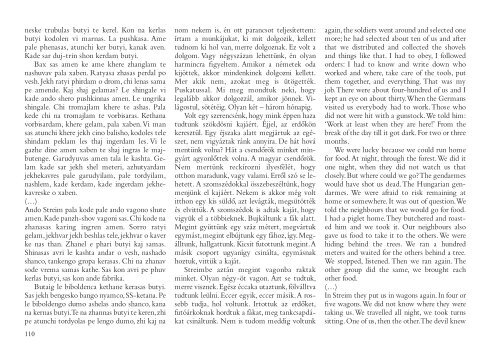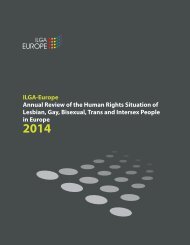Create successful ePaper yourself
Turn your PDF publications into a flip-book with our unique Google optimized e-Paper software.
neske trubulas butyi te kerel. Kon na kerlas<br />
butyi kodolen vi marnas. La pushkasa. Ame<br />
pale phenasas, atun chi ker butyi, kanak aven.<br />
Kade sar duj-trin shon kerdam butyi.<br />
Bax sas amen ke ame khere zhanglam te<br />
nashuvav pala xaben. Ratyasa zhasas perdal po<br />
vesh. Jekh ratyi phirdam o drom, chi lenas sama<br />
pe amende. Kaj shaj gelamas? Le shingale vi<br />
kade ando shero pushkinnas amen. Le ungrika<br />
shingale. Chi tromajlam khere te ashas. Pala<br />
kede chi na tromajlam te vorbisaras. Kethana<br />
vorbisardam, khere gelam, pala xaben. Vi man<br />
sas atunchi khere jekh cino balisho, kodoles tele<br />
shindam peklam les thaj ingerdam les. Vi le<br />
gazhe dine amen xaben te shaj ingras le maj -<br />
butenge. Garudyuvas amen tala le kashta. Ge -<br />
lam kade sar jekh shel meteri, azhutyardam<br />
jekhekavres pale garudyilam, pale tordyilam,<br />
nashlem, kade kerdam, kade ingerdam jekhe -<br />
kavreske o xaben.<br />
(…)<br />
Ando Streim pala kode pale ando vagono shute<br />
amen. Kade panzh-shov vagoni sas. Chi kode na<br />
zhanasas karing ingren amen. Sorro ratyi<br />
gelam, jekhvar jekh beshlas tele, jekhvar o kaver<br />
ke nas than. Zhanel e phari butyi kaj samas.<br />
Shinasas avri le kashta andar o vesh, nashado<br />
shanco, tankengo gropa kerasas. Chi na zhanav<br />
sode vrema samas kathe. Sas kon avri pe phuv<br />
kerlas butyi, sas kon ande fabrika.<br />
Butaig le biboldenca kethane kerasas butyi.<br />
Sas jekh bengesko bango nyamco, SS-ketana. Pe<br />
le biboldengo dumo ashelas ando shanco, kana<br />
na kernas butyi. Te na zhannas butyi te ke ren, zhi<br />
pe atunchi tordyolas pe lengo dumo, zhi kaj na<br />
110<br />
nom nekem is, én ott parancsot teljesítettem:<br />
írtam a munkájukat, ki mit dolgozik, kellett<br />
tudnom ki hol van, merre dolgoznak. Ez volt a<br />
dolgom. Vagy négyszázan lehettünk, én olyan<br />
harmincra figyeltem. Amikor a németek oda<br />
kijöttek, akkor mindenkinek dolgozni kellett.<br />
Mer akik nem, azokat meg is ütögették.<br />
Puskatussal. Mi meg mondtuk neki, hogy<br />
legalább akkor dolgozzál, amikor jönnek. Vi -<br />
lágostul, sötétéig. Olyan két – három hónapig.<br />
Volt egy szerencsénk, hogy mink éppen haza<br />
tudtunk szökdösni kajáért. Éjjel, az erdôkön<br />
keresztül. Egy éjszaka alatt megjártuk az egé -<br />
szet, nem vigyáztak ránk annyira. De hát hová<br />
mentünk volna? Hát a csendôrök minket min -<br />
gyárt agyonlôttek volna. A magyar csen dô rök.<br />
Nem mertünk reckírozni ilyesfélét, hogy<br />
otthon maradunk, vagy valami. Errôl szó se le -<br />
hetett. A szomszédokkal összebeszéltünk, hogy<br />
menjünk el kajáért. Nekem is akkor még volt<br />
itthon egy kis süldô, azt levágták, meg sütötték<br />
és elvittük. A szomszédok is adtak kaját, hogy<br />
vigyük el a többieknek. Bujkáltunk a fák alatt.<br />
Megint gyüttünk egy száz métert, megvártuk<br />
egy mást, megint elbújtunk egy fá hoz, így. Meg -<br />
álltunk, hallgattunk. Kicsit futottunk megint. A<br />
másik csoport ugyanígy csinálta, egy másnak<br />
hoztuk, vittük a kaját.<br />
Streimbe aztán megint vagonba raktak<br />
minket. Olyan négy-öt vagon. Azt se tudtuk,<br />
mer re visz nek. Egész éccaka utaztunk, fölválltva<br />
tud tunk leülni. Eccer egyik, eccer másik. A ros -<br />
sebb tudja, hol voltunk. Irtottuk az erdôket,<br />
futóárkoknak hordtuk a fákat, meg tankcsap dá -<br />
kat csináltunk. Nem is tudom meddig vol tunk<br />
again, the soldiers went around and selected one<br />
more; he had selected about ten of us and after<br />
that we distributed and collected the shovels<br />
and things like that. I had to obey, I followed<br />
orders: I had to know and write down who<br />
worked and where, take care of the tools, put<br />
them together, and everything. That was my<br />
job. There were about four-hundred of us and I<br />
kept an eye on about thirty. When the Germans<br />
visited us everybody had to work. Those who<br />
did not were hit with a gunstock. We told him:<br />
‘Work at least when they are here!’ From the<br />
break of the day till it got dark. For two or three<br />
months.<br />
We were lucky because we could run home<br />
for food. At night, through the forest. We did it<br />
one night, when they did not watch us that<br />
closely. But where could we go? The gendarmes<br />
would have shot us dead. The Hun garian gendarmes.<br />
We were afraid to risk remaining at<br />
home or somewhere. It was out of question. We<br />
told the neighbours that we would go for food.<br />
I had a piglet home. They butchered and roasted<br />
him and we took it. Our neighbours also<br />
gave us food to take it to the others. We were<br />
hiding behind the trees. We ran a hundred<br />
meters and waited for the others behind a tree.<br />
We stopped, listened. Then we ran again. The<br />
other group did the same, we brought each<br />
other food.<br />
(…)<br />
In Streim they put us in wagons again. In four or<br />
five wagons. We did not know where they were<br />
taking us. We travelled all night, we took turns<br />
sitting. One of us, then the other. The devil knew



